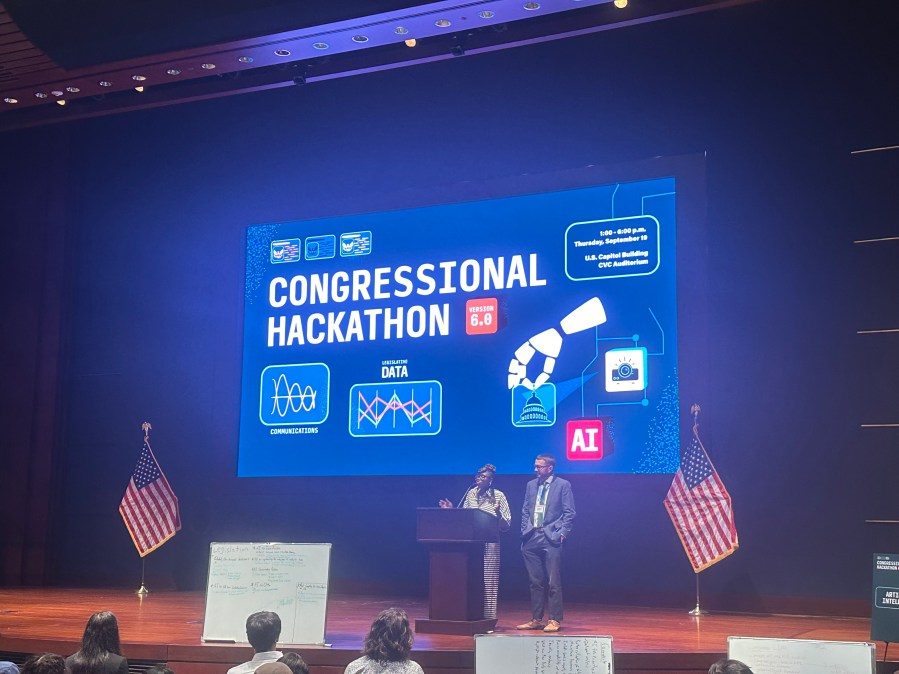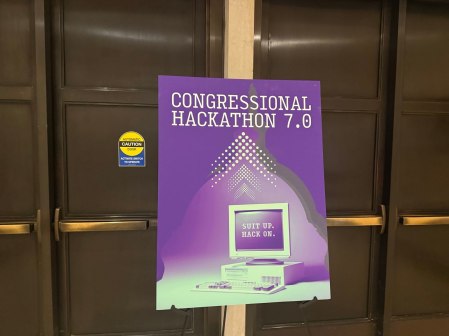Staff directory, bill summary app among tools presented at Congressional Hackathon

Tools that could make it easier to look up House staffer contact information, create one-page summaries of bills, track inauguration ticket distribution, and build AI apps a la carte were among the many presentations at Congress’s biggest modernization idea-sharing and brainstorming event Thursday.
The sixth-ever Congressional Hackathon, which is held in the U.S. Capitol with the support of the House Office of the Chief Administrative Officer, featured a host of concepts and actual products designed to address problems faced by the legislative branch. Those pitches ranged from things being actively pursued by the CAO itself to tools designed by staffers and companies. They also, for the first time, included presentations from the Congressional App Challenge, a competition for students across the country.
“With our new tools we can shape and create a 21st century Congress, adapt to the modern era, and do it in a way that makes sense,” House Speaker Mike Johnson, R-La., said in remarks at the beginning of the event to a room of staffers, technologists, advocates and students.
In a written statement to FedScoop following the hackathon, CAO Catherine Szpindor called this year’s event a “major success” and said it had “record attendance.”
“Just like at previous Hackathons, it was amazing to hear the amazing pitches and ideas from so many people coming together with one common goal — to develop innovative technological solutions for Members and staff,” Szpindor said.
While it’s mostly a brainstorming event, past hackathons have seen quite a bit of success in generating ideas that go on to be implemented, such as providing access to raw legislative data and digitizing casework. More recently, two of the five top recommendations from last year’s event have been implemented and others are in the works.
Among those ideas shared in the “lighting round” of pitches was a tool that would allow those working on Capitol Hill to look up contact information for staff in a centralized location.
The product, called LegiDex, is being developed by the House Digital Service and was among the many recommendations made by the now-concluded Select Committee on the Modernization of Congress, according to Shaun Brown, a software developer with the CAO House Digital Service team, who demonstrated the tool.
On that platform, users can search for emails, phone numbers and office locations of other House staffers and bulk-download batches of up to 500 email addresses at a time. According to Brown, the tool also shows the data source for each staffer, providing some transparency, and staffers are able to edit those profiles.
That platform, which “has been many years in the making,” is also about two to three weeks away from a pilot, Brown said.
Tara Burchmore, a fellow for Sen. Kirsten Gillibrand, D-N.Y., and Bethan Saunders, a staffer for Sen. Mazie Hirono, D-Hawaii, presented their idea for a tool that could help search for existing bills that were similar to new legislative ideas, so lawmakers and staff can research what has already been done.
Dean Alderucci, a senior advisor on AI for the House Science, Space, and Technology Committee, shared an idea he’s been working on for an “AI factory” of sorts that would allow users to create custom products from existing components. Those components would be akin to LEGOs that allow a user to build a variety of different things from the same blocks.
Concluding his presentation, Alderucci pointed to the ideas shared at the hackathon and previous iterations, saying “let’s not think about which of those products we should select and build. Let’s build them all.”
Some tools presented were ready to be used. For example, Ashley Nagel, a tech and AI fellow with Sen. Brian Schatz, D-Hawaii, pointed the audience to a public GPT app called Bill Bot that could be used to help with tasks like writing one-pagers of bills. While Nagel said there are many tasks she wouldn’t recommend trusting an AI to do, evidence suggests that summarization is a task the technology is “very good” at completing.
Melissa Dargan, a former staffer, hackathon veteran and co-founder and CEO of the congressional tour organizing platform TourTrackr, remotely presented a new product called InaugTrackr that will allow offices to track the inauguration tickets they give to constituents — a process that’s usually done manually. That tool, which Dargan demonstrated, will allow users to see the status of requests and whether those tickets have been picked up, including historical data.
The new product is the latest solution from Dargan, who presented the initial idea of TourTrackr at the 2017 hackathon and left the Hill to work on it. During her presentation, Dargan said TourTrackr is now used by 135 congressional offices.
While some presentations were for ideas in development or real products, others were for ideas in early phases. For example, Deputy Director of Operations for the House Office of the Whistleblower Ombuds John Whitty shared the idea to build a concierge tool to help staff interact with whistleblowers.
Such a tool could potentially be “toggled on” within the existing correspondence management systems when a staff member is making a record that involves a whistleblower and might provide best practices and disclaimers for that interaction, Whitty said.
While still just a concept, Whitty said the office that coaches lawmakers on working with whistleblowers already has the information needed to fuel such a system, and he was there to “plant the seed for this idea” and to “stimulate interest in development.”
Keeping with years past, the event hosted breakout groups to brainstorm ideas on topics like AI, constituent services, modern committees and cybersecurity. Each of those groups also presented ideas from their discussions at the end of the event.
During remarks at the event, Rep. Derek Kilmer, D-Wash., the ranking member on the Committee on House Adminsitration’s modernization subcommittee who chaired the select committee on the same subject, announced plans to introduce a resolution that would create a congressional modernization competition for students.
“We’ve seen through the hackathon and through the Modernization Committee, ideas to modernize Congress can and should come from Americans of different ages, backgrounds, and walks of life,” Kilmer said. “So a congressional modernization competition would allow the House to both encourage students’ participation in civic life and provide Congress with additional recommendations to modernize and improve its work.”
While the event concluded, work for the CAO and House Digital Service in the year ahead will continue with two modernization projects Szpindor called “ambitious.” Those two projects, which are both funded by the Modernization Initiatives account, are the staff directory and a casework aggregator the office is also developing, she said.
“Both projects are in active development with pilots beginning soon,” Szpindor said in the statement to FedScoop.
In addition to the event, the CAO on Thursday also released a summary of a new House AI policy jointly with the Committee on House Administration, establishing a chamber-wide framework. That policy creates guardrails and a process for approving tools and uses that both the CAO and the committee will oversee.
“Following the release of our new AI Policy, the CAO will also continue its ongoing work in AI, and we are excited to move into a new phase of testing, experimentation, training, and upskilling,” Szpindor said.






